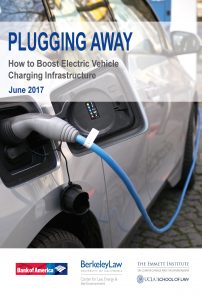The electric vehicle revolution appears to be passing renters by. And the solution involves deploying more charging stations.
In a new working paper and blog by UC Berkeley energy economist Lucas Davis, he finds that homeowners are much more likely than renters to own an EV, even with similar incomes. He found, for example, that among households with incomes between $75,000 and $100,000 per year, 1 in 130 homeowners owned an EV, while only 1 in 370 renters owned one.
Why the discrepancy? As Davis explains, it’s about access to charging:
Most homeowners have a garage, a driveway or both. That makes charging extremely convenient for them because they can charge their vehicles at night.
It’s not so easy, however, for many renters. Renters are more likely to live in multi-unit buildings and parking spots may not be assigned, or there may not be any parking spots at all. The federal data doesn’t provide any information about parking availability, but this likely helps explain the disparity between homeowners and renter EV ownership rates.
There is also the related question of charging equipment. For homeowners, it is relatively straightforward to invest in a 240-volt outlet, electric panel upgrades and other improvements to speed up charging. These investments can cost $1,000 or more, but are a good investment for a homeowner planning to stay put.
Making this investment is trickier for renters, however. They may not want to invest their own money in a property they don’t own and their landlords may be unwilling to let them do it in any case due to liability and other concerns.
 The best solution is to deploy more EV charging stations at workplaces and in fast-charging “plazas,” as we described in our 2017 Berkeley / UCLA Law report Plugging Away.
The best solution is to deploy more EV charging stations at workplaces and in fast-charging “plazas,” as we described in our 2017 Berkeley / UCLA Law report Plugging Away.
And more charging stations are needed not just for apartment dwellers and renters but to meet our climate goals more generally. In a recent report by the Center for American Progress, the authors found that most states in the U.S. have funded less than half of the deployment needed to meet our Paris climate accord commitment.
As E&E News reported on the study [paywalled]:
The analysis found that some 330,000 new public Level 2 and direct-current fast-charging stations would need to go up around the country by 2025.
At a cost of $4.7 billion, those networks would feed power to the 14 million plug-in hybrids and battery electrics necessary to bring greenhouse gas emissions from light-duty cars in line with the accord.
It’s a lot of money that’s needed — but also potentially a lot of revenue from selling electricity as vehicle fuel. With more utility and potentially automaker investment, this infrastructure goal should be feasible to achieve, if we muster the political will.


